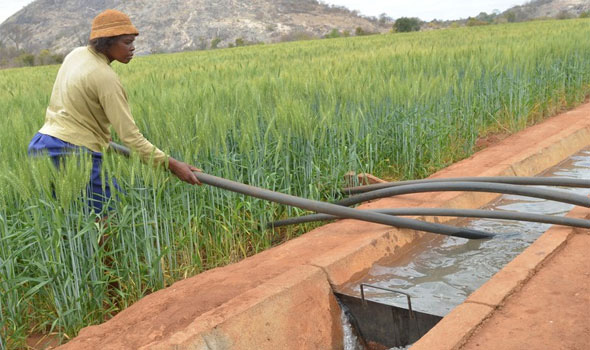Professor Ncube revels in irrigation projects, wheat success
Zimbabwe’s investment in dam and irrigation projects has shown that the country is in the right direction as it has begun to bear fruits with a record wheat production of about 380 000 tonnes being realised last year, Finance and Economic Development Minister Professor Mthuli Ncube has said.
The Second Republic led by President Mnangagwa, said Prof Ncube, will continue to make investment in infrastructure projects such as dams and irrigation as a panacea to economic growth with results in the agriculture sector beginning to show an upward trajectory.
President Mnangagwa
Prof Ncube said this on Tuesday evening during a virtual interview with the Zimpapers Television Network from Davos, Switzerland, where he is attending the annual World Economic Forum.
The year 2022 will go down in history as the farming season Zimbabwe recorded its highest wheat harvest since production of the cereal started in 1966, thanks to the Government’s Agriculture Recovery Plan aimed at boosting food security and nutrition in line with Vision 2030 which has been anchored by the National Development Strategy 1.
This year saw the country recording surplus after harvesting 380 000 tonnes of wheat from the 80 883 hectares planted by farmers during the winter cropping season
National Development Strategy 1 (NDS1)
Prof Ncube said African countries including Zimbabwe were saddled with many challenges that includes debt overhung, climate change among others and Harare’s investment in infrastructure such as irrigation is one of the solution to overcome those impediments.
“Yes indeed we have to follow similar strategies as those that apply to Africa to address challenges. Currency stabilisation is critical and resolving external debt and not to accumulate too much debts. We need to continue with our investment in public sector infrastructure program, that will ensure that we invest in growth.
“All these are important ingredients to make sure that we tie up. We are fortunate with the rains and this is encouraging indeed, so the risk of climate change is not high once agriculture performs. Other sectors will perform because of forward and backward linkages with agriculture,” said Prof Ncube.
“It is not surprising this year we did well in terms of our winter wheat programme where we produced 380 00 tonnes of wheat hectares. Results are showing that investment in these dams and irrigation is the way to go.”
Following the success of the wheat production last season, the value chain has the potential to increase its production reaching national sufficiency and export the surplus.
The Russia and Ukraine Conflict has revealed the need for a nation to rely on locally produced food as these two countries used to be the major wheat producers globally and the conflict meant disruption of food supplies.
Prof Ncube said Zimbabwe had since started meetings aimed at dealing with the country’s debt saying there would be little fiscal space if issues such as debt overhung, inflation and currency stability were not addressed.
Wheat – Image taken from Shutterstock
“There must be diversification in the mining sector so that value from minerals can be maximised. In countries where there is currency volatility they need to stabilise currencies and contain inflation in the main. There is little fiscal space in those countries, we just have to work hard and try to live within our means and invest in public infrastructure,” he said.
“Each individual country has its own debt situation. In Zimbabwe we have got our own process which has begun. We have our second meeting next week. The bulk of these debt is interest and penalties.”
Russia-Ukraine conflict
Prof Ncube said there was need to deal with the issue of climate change which he said ought to be dealt with, lest it will see more than 200 million globally migrating mainly from developing countries to First World countries.-chronicle.co.zw










